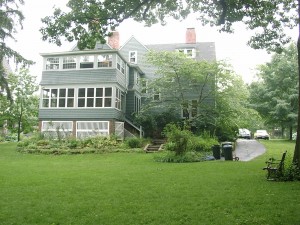It is much more difficult to write about a more-or-less normal life, one lived without major stress and trauma, than it is to write about personal unhappiness. Happiness makes for boring reading, which is why Satan is such an interesting figure in John Milton’s Paradise Lost. Satan is unhappy in a big way. Romances, on the other hand, are interesting because of the obstacles in the paths of the lovers. Once those are overcome, there is only the prospect of wedded bliss, shitty diapers, gain of weight, loss of hair, not the kind of stuff that makes for happy, or even interesting reading, which is probably the reason War and Peace ends with the marriage of Natasha and Pierre. Oops! Did I just give something away? Truly great love stories end in the death of one or both of the protagonists (think Anna Karenin—a much better book than War and Peace— or Heathcliff and Cathy, in Wuthering Heights). Nothing we can do about that; it is just the way things are when they’re going well, not too exciting in the retelling and possibly somewhat soporific.
So, for life in Ridgewood. The children grew up. They went to school uneventfully, being driven to this or that after school activity, Linda went to school for her Ph.D., and I tried to be a normal, American, suburban father and husband. No one suffered from neglect or abuse; no one did drugs or alcohol in a major way, channels of communication in the family were kept open, mostly by Linda, which is not to say there were no major disagreements or crises, but they were generally resolved.
I really worked at being a normal suburban father and husband, which is probably how I wound up first as vice-president, then as president of the local equivalent of the PTA, in Ridgewood called the Home and School Association. Yes, I was vice president and president of the Orchard School Home and School Association for several years. There may be some who question how normal a thing this was for a man to do, but this was the era of women’s liberation, so why not? During my stint in those positions we organized the parents into assembling a playground made entirely of tires, and later, provided the school with BetaMax TV recorders. Dr. Abate, the principal, didn’t want them, but admitted cheerfully enough later that he had been wrong on that matter and had found them useful, particularly on rainy days when the kids couldn’t play outdoors.
I should also mention that I loved mowing grass in the summer and shoveling snow out of the driveway in the winter, mostly because I could see the result of my work. This was in sharp contrast to teaching, where I never saw any results of my efforts, an experience probably common to many teachers. In the classroom, you just did your stuff, but you didn’t actually see any changes in your students. Those might come later, long after your students had left you and become adults in their own right, but you would never see them. I became so good at organic lawn maintenance that I became the neighborhood guru on the subject, and neighbors asked me for advice about growing grass; something I found passing strange in view of being a transplanted New Yorker who knew next to nothing about the subject. All of that, in addition to high school football on Saturdays, finally made me a real American, suburban father and husband. Or at least, I think so. . .

